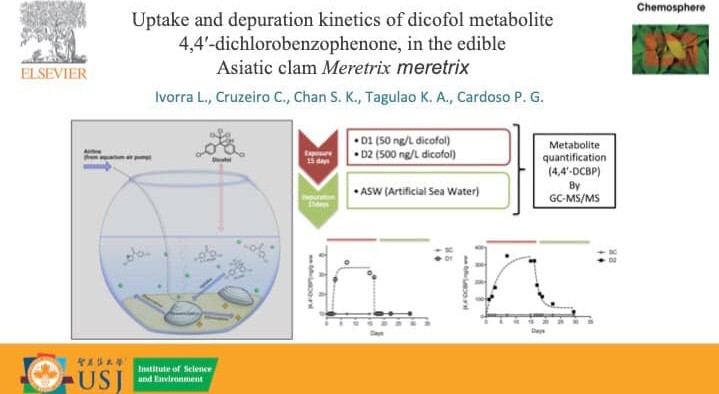ISE Researchers Determined How a Locally Consumed Asiatic Clam Responds To DCBP, a Breakdown Product of the Pesticide Dicofol

ISE Researchers Determined How a Locally Consumed Asiatic Clam Responds To DCBP, a Breakdown Product of the Pesticide Dicofol
04
Jul
04/07/2019
Researchers from USJ’s ISE determined how the locally consumed Asiatic clam Meretrix meretrix responds to 4,4-dichlorobenzophenone (DCBP), a breakdown product of the pesticide Dicofol (DDT-like)
Researchers from the Institute of Science and Environment (ISE) of the University of Saint Joseph have determined how the locally consumed Asiatic clam Meretrix meretrix responds to 4,4-dichlorobenzophenone (DCBP), a breakdown product of the pesticide Dicofol (DDT-like).
The study, published in Chemosphere, evaluated how clams uptake and depurate environmental (50 ng/L) and supra-environmental (500 ng/L) concentrations of DCBP in water. Similar bioconcentration factors were obtained for both concentrations of DCBP but only clams exposed to environmental concentrations successfully depurated after 24 h. Although clams exposed to supra-concentration presented higher elimination factor, they did not reach the original levels after depuration. Moreover, values detected in these clams were higher than the Maximum Residue Level (10 ng/g) established by the European legislation. This indicates that longer periods of depuration time than the ones used in this study may be needed in order to reach safe levels for human consumption.
The study provides important information on the danger that DCBP poses and subsequent implications to consumers if depuration time given to exposed clams is not enough. This will also help formulate relevant warning measures in aquaculture (in the event of excessive water contamination), for example, whether to ban or recommend a longer depuration period than what is normally being practiced.
This study was accomplished through the MacGroves project funded by the Macao Science and Technology Development Fund (FDCT), coordinated by Prof. Karen Araño Tagulao and Prof. Chan Shek Kiu of ISE. The team also included Lucia Ivorra (PhD student, ISE/USJ), Patricia Cardoso Teixeira (Consultant, CIIMAR, University of Porto) and Catarina Cruzeiro (Consultant, University of Coimbra).









